Basu knew early on that VR would be a strong way to tell this story “because it’s about the claustrophobia, the isolation”. “The medium is the message,” she told the audience at the Format conference during the festival’s opening weekend. “I’m marrying the content with the technology which I think works, rather than it being a gimmick. I am a photographer who shoots film and the last person who would do this unless I strongly believed [it was appropriate].
“I saw the [story] through the VR – it’s evening, it’s dark, you can’t see anything,” she continued. “You hear the sound of insects buzzing around you. I’ve been to this place so I know what it’s like, and I knew filming it could make you really feel that you were in that space.”
But while she’s exploring hybrid-platform storytelling, she remains a documentary photographer at heart, keen to reach wider audiences and advocate for change. “I don’t mind being in an art world because I do consider myself to also be a part of that world, but I feel it’s too small a world,” she says. “We have to reach a larger audience.”
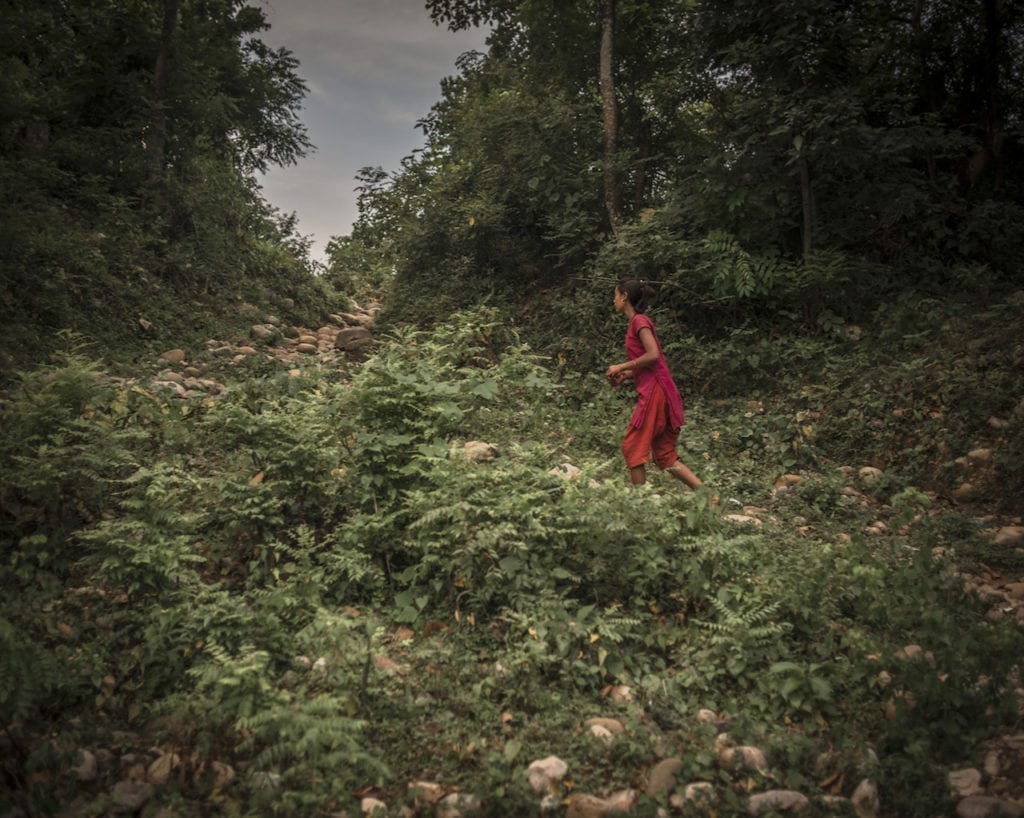 Radha Bishwa Karma, 16 years old. “My parents don’t work in India. My grandmother doesn’t let me stay at home. She gets cross if I come home and I often don’t get my meals. I wish sometimes my mother was here to take me home or give me medicine, especially when I am in pain. It’s dark, and there is no light. I feel so scared someone might come.” Surkhet district, Nepal. From the series A Ritual of Exile © Poulomi Basu /Magnum Foundation Emergency Fund with field support in Surkhet by WaterAid
Raised by her mother in Calcutta, Basu has herself experienced life under a patriarchal society, and says she had to work hard to break through. “In India, no one supported me because men rule the industry,” she says. “I was very lucky as I had good friends [in the industry], but I struggled a lot and it took me a long time…
Radha Bishwa Karma, 16 years old. “My parents don’t work in India. My grandmother doesn’t let me stay at home. She gets cross if I come home and I often don’t get my meals. I wish sometimes my mother was here to take me home or give me medicine, especially when I am in pain. It’s dark, and there is no light. I feel so scared someone might come.” Surkhet district, Nepal. From the series A Ritual of Exile © Poulomi Basu /Magnum Foundation Emergency Fund with field support in Surkhet by WaterAid
Raised by her mother in Calcutta, Basu has herself experienced life under a patriarchal society, and says she had to work hard to break through. “In India, no one supported me because men rule the industry,” she says. “I was very lucky as I had good friends [in the industry], but I struggled a lot and it took me a long time…
“The one thing I have always believed is that I have to stick to my vision,” she adds. “At the end of the day, photography is a difficult profession and if you believe in the work, you have to be persistent. As a woman you have to be persistent anyway, but if you’re a person of colour, you have to work ever harder.”
Now this determination seems to be paying off, with Basu recently shortlisted for the Mack First Book award for another project, Centralia, which she describes as “an investigative journey into the dystopian democracy of India”. Meanwhile she is also busy putting the finishing touches to the A Ritual of Exile films, and working more on VR. She hopes to explore this platform more in future, and also experiment with other digital web-based platforms.
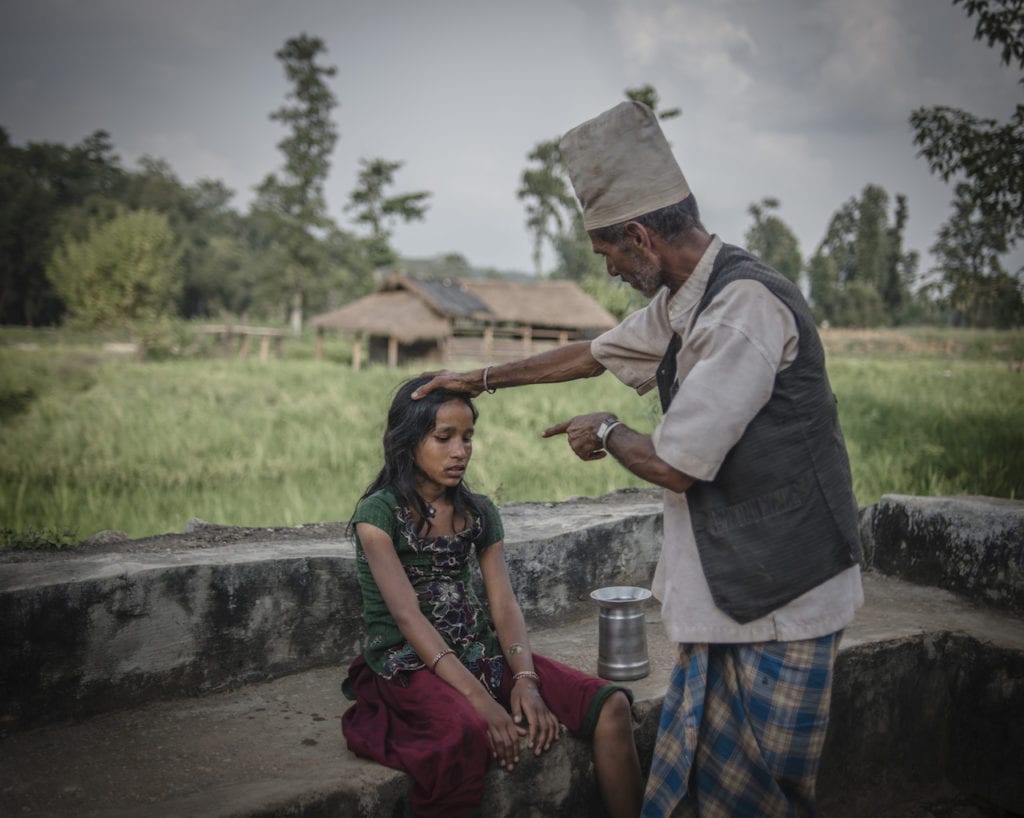 Devi Ram Dhamala, traditional healer, 59. Traditional healers often use extreme verbal and physical abuse to heal young girls who are ill during menstruation or even otherwise, believing they are possessed by evil spirit. Surkhet district, Nepal. From the series A Ritual of Exile © Poulomi Basu /Magnum Foundation Emergency Fund with field support in Surkhet by WaterAid
Ultimately, she says, the aim is to effect change, whether she presents her work via photobooks, VR installations, films or straight images. “None of these are in competition with each other,” she says. “That’s the most important thing. It’s about creating a synergy between different forms… I’m [part of] a new generation of storytellers who are breaking rules and looking into new things, who keep trying to push the medium.
Devi Ram Dhamala, traditional healer, 59. Traditional healers often use extreme verbal and physical abuse to heal young girls who are ill during menstruation or even otherwise, believing they are possessed by evil spirit. Surkhet district, Nepal. From the series A Ritual of Exile © Poulomi Basu /Magnum Foundation Emergency Fund with field support in Surkhet by WaterAid
Ultimately, she says, the aim is to effect change, whether she presents her work via photobooks, VR installations, films or straight images. “None of these are in competition with each other,” she says. “That’s the most important thing. It’s about creating a synergy between different forms… I’m [part of] a new generation of storytellers who are breaking rules and looking into new things, who keep trying to push the medium.
“I’m interested in seeing how different techniques can help me tell the story better,” she adds. “For me, photography is a means to an end, not an end in itself. I see it as a way to make people engage and to feel a sense of responsibility towards the times we’re living in…To make people feel: we’ve got to do something about it. I don’t want my work to be closed, or to point fingers back at me. It has to point fingers at the issue.”
Format17 runs in Derby until 23 April 2017 www.formatfestival.com www.poulomibasu.com
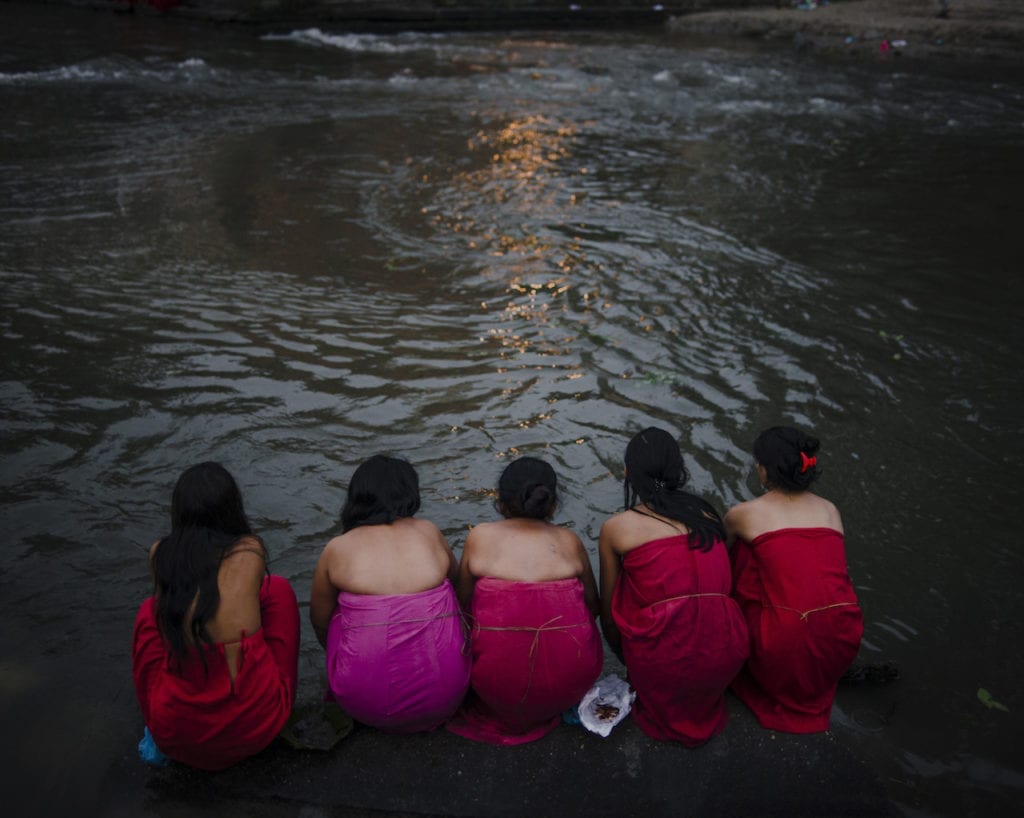 Women observing the ritual to wash away the sins committed during mentruation at the annual Rishi Panchami festival, Kathmandu. Nepal. From the series A Ritual of Exile © Poulomi Basu /Magnum Foundation Emergency Fund
Women observing the ritual to wash away the sins committed during mentruation at the annual Rishi Panchami festival, Kathmandu. Nepal. From the series A Ritual of Exile © Poulomi Basu /Magnum Foundation Emergency Fund
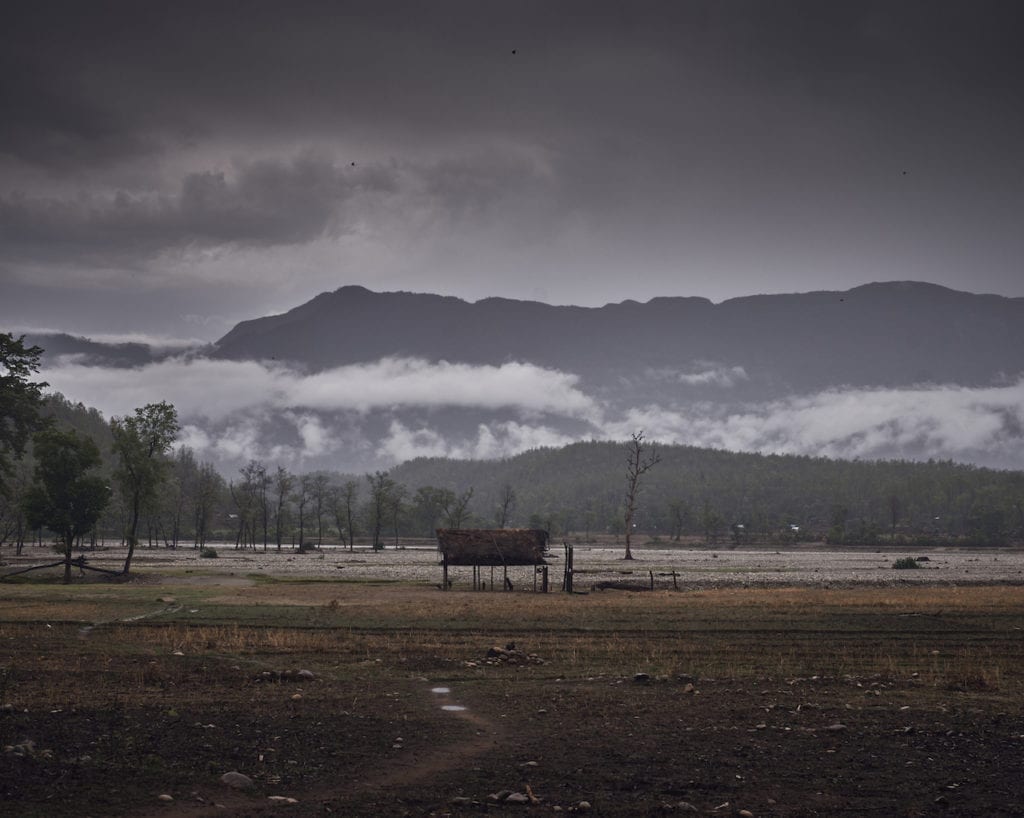 A chhau, a space of exile by the river. Ujjwali, 48, who was living her exile there earlier told me “The good men understand what the women are going through, that it is difficult for women when they have to stay out of the house but there are many men who are stupid and illiterate and they don’t want to understand. They beat their wives, call them bad names (daughter of a whore) and beat them and obligate them to stay out of the house in the goth. The ones who are educated and understand want their wives to stay at home but it’s mostly women who make other women stay out.” Nepal, 2016. From the series A Ritual of Exile © Poulomi Basu /Magnum Foundation Emergency Fund
A chhau, a space of exile by the river. Ujjwali, 48, who was living her exile there earlier told me “The good men understand what the women are going through, that it is difficult for women when they have to stay out of the house but there are many men who are stupid and illiterate and they don’t want to understand. They beat their wives, call them bad names (daughter of a whore) and beat them and obligate them to stay out of the house in the goth. The ones who are educated and understand want their wives to stay at home but it’s mostly women who make other women stay out.” Nepal, 2016. From the series A Ritual of Exile © Poulomi Basu /Magnum Foundation Emergency Fund
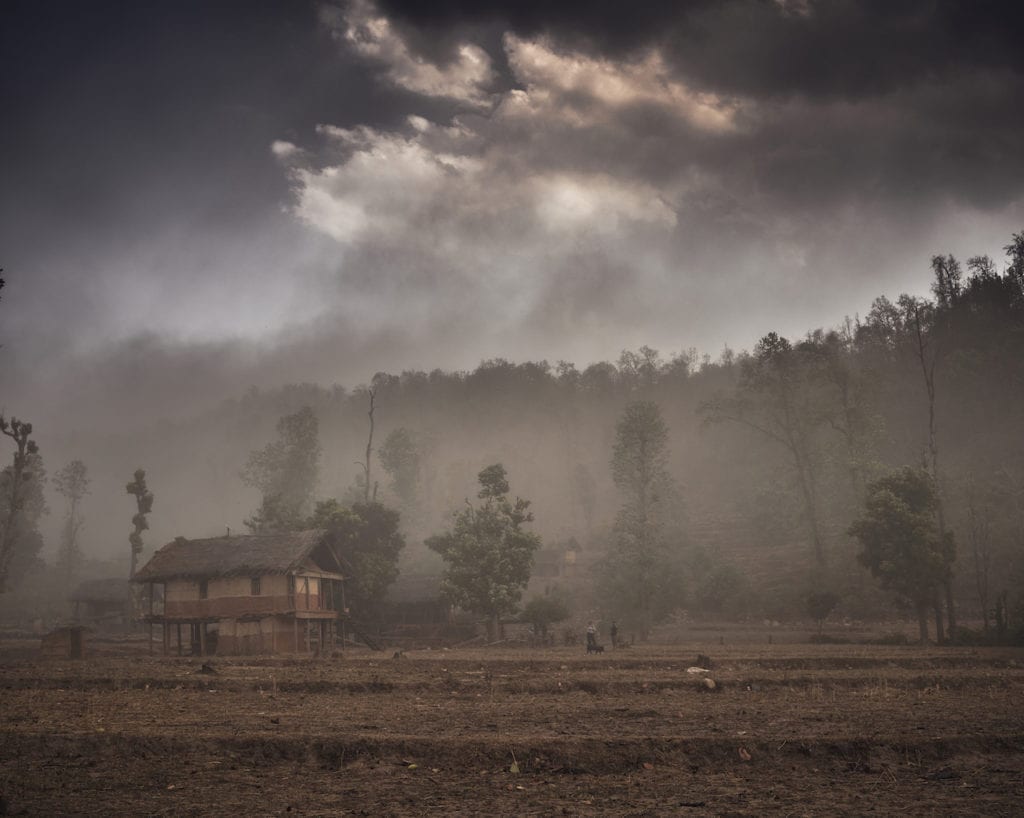 “It happened six or seven years ago. The girl in chhau was 15. The boys were 18-19 years old, local boys. The boy who spread the rumours escaped to India and hasn’t come back. One is innocent and is in jail with another boy. The boy attacked her at night with another boy who, maybe because he couldn’t take part, spread rumours about her in the village. The girl couldn’t cope and committed suicide. That’s what we think. What actually happened only the boy knows and the girl knew. The reality I don’t know. The family of the girl left the village.” Dhana, 29, Tatopani, Nepal, 2016. From the series A Ritual of Exile © Poulomi Basu /Magnum Foundation Emergency Fund
“It happened six or seven years ago. The girl in chhau was 15. The boys were 18-19 years old, local boys. The boy who spread the rumours escaped to India and hasn’t come back. One is innocent and is in jail with another boy. The boy attacked her at night with another boy who, maybe because he couldn’t take part, spread rumours about her in the village. The girl couldn’t cope and committed suicide. That’s what we think. What actually happened only the boy knows and the girl knew. The reality I don’t know. The family of the girl left the village.” Dhana, 29, Tatopani, Nepal, 2016. From the series A Ritual of Exile © Poulomi Basu /Magnum Foundation Emergency Fund






